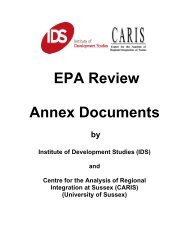The Impact of Energy Use on Poor Urban Livelihoods in ... - DfID
The Impact of Energy Use on Poor Urban Livelihoods in ... - DfID
The Impact of Energy Use on Poor Urban Livelihoods in ... - DfID
You also want an ePaper? Increase the reach of your titles
YUMPU automatically turns print PDFs into web optimized ePapers that Google loves.
<str<strong>on</strong>g>The</str<strong>on</strong>g> impact <str<strong>on</strong>g>of</str<strong>on</strong>g> energy <strong>on</strong> poor urban livelihoods, Arusha, Tanzania<br />
EXECUTIVE SUMMARY<br />
Background<br />
<str<strong>on</strong>g>The</str<strong>on</strong>g>re are very few micro level studies <strong>on</strong> energy use and the impact <str<strong>on</strong>g>of</str<strong>on</strong>g><br />
energy <strong>on</strong> the livelihoods <str<strong>on</strong>g>of</str<strong>on</strong>g> the urban poor, despite the fact that urban<br />
families may spend a third or more <str<strong>on</strong>g>of</str<strong>on</strong>g> their <strong>in</strong>come <strong>on</strong> energy.<br />
Furthermore, exist<strong>in</strong>g studies tend to address technological/ec<strong>on</strong>omic<br />
issues, rather than social aspects <str<strong>on</strong>g>of</str<strong>on</strong>g> energy use and are quantitative<br />
rather than qualitative <strong>in</strong> approach.<br />
This DFID funded study (R8321) was undertaken jo<strong>in</strong>tly by the<br />
Development Plann<strong>in</strong>g Unit, University College L<strong>on</strong>d<strong>on</strong> (DPU), and the<br />
Community Development Tra<strong>in</strong><strong>in</strong>g Institute (CDTI), Tengeru, and<br />
addresses this imbalance by exam<strong>in</strong><strong>in</strong>g the energy/poverty/gender<br />
relati<strong>on</strong>ships <strong>in</strong> two urban wards, Daraja Mbili and Kaloleni, <strong>in</strong> Arusha,<br />
Tanzania. <str<strong>on</strong>g>The</str<strong>on</strong>g> core team was supported by the staff <str<strong>on</strong>g>of</str<strong>on</strong>g> WODSTA<br />
(Women’s Development <str<strong>on</strong>g>of</str<strong>on</strong>g> Science and Technology Associati<strong>on</strong>), a local<br />
NGO; Arusha Municipality employees at the urban and ward level; a<br />
virtual steer<strong>in</strong>g committee; and, most importantly, the women, men and<br />
children liv<strong>in</strong>g <strong>in</strong> the two study wards.<br />
Research focus<br />
<str<strong>on</strong>g>The</str<strong>on</strong>g> study perceives poverty as multi-dimensi<strong>on</strong>al and uses a<br />
susta<strong>in</strong>able livelihoods framework to structure poor men’s and women’s<br />
percepti<strong>on</strong>s <str<strong>on</strong>g>of</str<strong>on</strong>g> their c<strong>on</strong>diti<strong>on</strong>. It acknowledges that urban poverty is<br />
qualitatively different from rural poverty and the significance <str<strong>on</strong>g>of</str<strong>on</strong>g> gender<br />
roles with<strong>in</strong> a household. It accepts that energy has a significant role <strong>in</strong><br />
improv<strong>in</strong>g the lives <str<strong>on</strong>g>of</str<strong>on</strong>g> the urban poor and sets out to clarify the nature <str<strong>on</strong>g>of</str<strong>on</strong>g><br />
the transform<strong>in</strong>g process. In particular, it tests the assumpti<strong>on</strong>s<br />
underly<strong>in</strong>g two <str<strong>on</strong>g>of</str<strong>on</strong>g> the Millennium Development Goals (MDG) 2 and 3. 1<br />
Purpose<br />
<str<strong>on</strong>g>The</str<strong>on</strong>g> research has two aims:<br />
� to provide stakeholders (<strong>in</strong>clud<strong>in</strong>g policy makers, planners and<br />
implementers <strong>in</strong> the public and community sectors and poor people<br />
themselves) with an improved understand<strong>in</strong>g <str<strong>on</strong>g>of</str<strong>on</strong>g> how access to<br />
energy impacts <strong>on</strong> the livelihoods <str<strong>on</strong>g>of</str<strong>on</strong>g> poor urban women and girls. In<br />
particular, to c<strong>on</strong>sider how changes <strong>in</strong> the energy decisi<strong>on</strong>-mak<strong>in</strong>g<br />
process, and women’s and girls' energy resp<strong>on</strong>sibilities, might affect<br />
their capacity to take advantage <str<strong>on</strong>g>of</str<strong>on</strong>g> educati<strong>on</strong>al opportunities (MDG2)<br />
and c<strong>on</strong>tribute to their greater empowerment and greater equality <strong>in</strong><br />
the household (MDG 3); and<br />
1<br />
Specifically the achievement <str<strong>on</strong>g>of</str<strong>on</strong>g> primary educati<strong>on</strong> and the promoti<strong>on</strong> <str<strong>on</strong>g>of</str<strong>on</strong>g> gender equality and the<br />
empowerment <str<strong>on</strong>g>of</str<strong>on</strong>g> women<br />
v Development Plann<strong>in</strong>g Unit, UCL L<strong>on</strong>d<strong>on</strong><br />
Dr. Sheilah Meikle and Patrice North
















